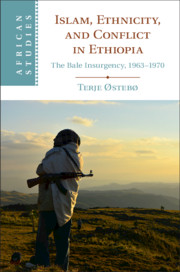Crossref Citations
This Book has been
cited by the following publications. This list is generated based on data provided by Crossref.
2020.
Islam, Ethnicity, and Conflict in Ethiopia.
p.
288.
Østebø, Terje
and
Tronvoll, Kjetil
2020.
Interpreting contemporary Oromo politics in Ethiopia: an ethnographic approach.
Journal of Eastern African Studies,
Vol. 14,
Issue. 4,
p.
613.
2020.
Islam, Ethnicity, and Conflict in Ethiopia.
p.
xiii.
2020.
Islam, Ethnicity, and Conflict in Ethiopia.
p.
119.
2020.
Islam, Ethnicity, and Conflict in Ethiopia.
p.
89.
2020.
Islam, Ethnicity, and Conflict in Ethiopia.
p.
234.
2020.
Islam, Ethnicity, and Conflict in Ethiopia.
p.
319.
2020.
Islam, Ethnicity, and Conflict in Ethiopia.
p.
311.
2020.
Islam, Ethnicity, and Conflict in Ethiopia.
p.
350.
2020.
Islam, Ethnicity, and Conflict in Ethiopia.
p.
155.
2020.
Islam, Ethnicity, and Conflict in Ethiopia.
p.
1.
2020.
Islam, Ethnicity, and Conflict in Ethiopia.
p.
34.
2020.
Islam, Ethnicity, and Conflict in Ethiopia.
p.
209.
2020.
Islam, Ethnicity, and Conflict in Ethiopia.
p.
66.
2020.
Islam, Ethnicity, and Conflict in Ethiopia.
p.
259.
2020.
Islam, Ethnicity, and Conflict in Ethiopia.
p.
181.
Østebø, Terje
2020.
Islam, Ethnicity, and Conflict in Ethiopia.
DUİBE, Negesso Jima
2021.
Oromo’s religious conversion in Ethiopia: Historical perspective.
Antropoloji,
p.
66.
Pailey, Robtel Neajai
2021.
Development, (Dual) Citizenship and Its Discontents in Africa.
2021.
Race and Diplomacy in Zimbabwe.
p.
346.



